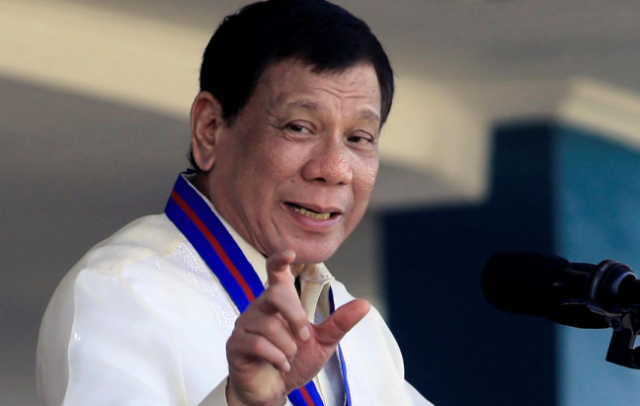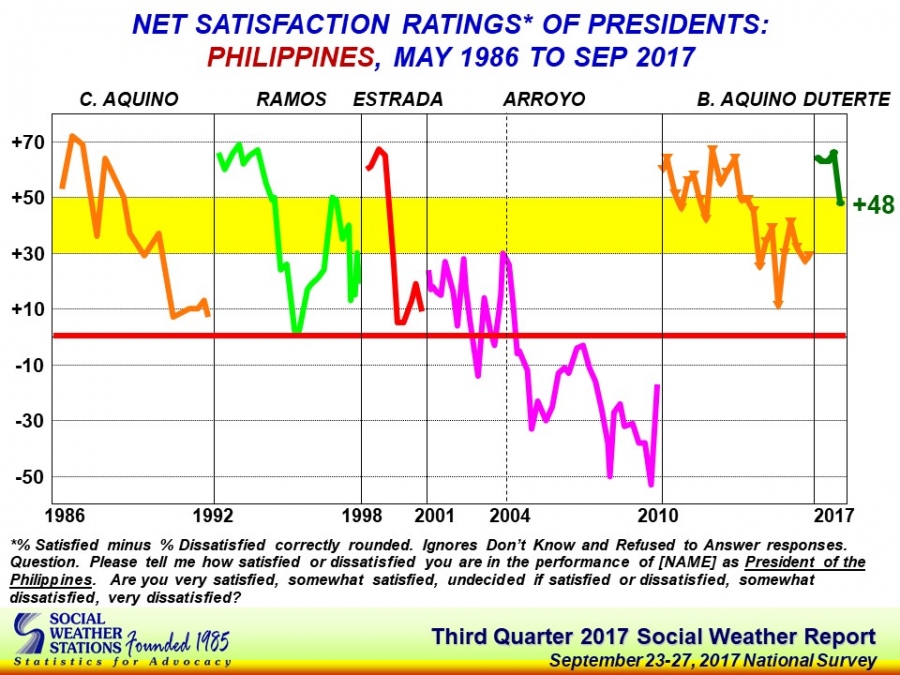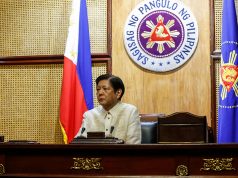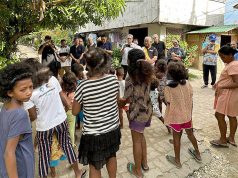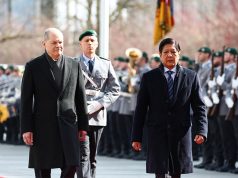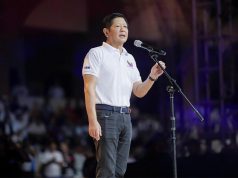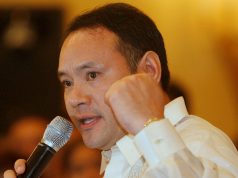MANILA – (UPDATE, 11:35 P.M) The Third Quarter 2017 Social Weather Survey, conducted from September 23-27, 2017, found gross satisfaction with President Rodrigo Duterte fell by 11 points from 78%, gross dissatisfaction rose by 7 points from 12%, and gross undecided rose by 4 points from 10%.
In terms of net satisfaction, the poll found 67% of adult Filipinos satisfied, 19% dissatisfied, and 14% undecided, yielding a net satisfaction rating of +48 (% satisfied minus % dissatisfied), classified by SWS as good – 18 points below the very good +66 (78% satisfied, 12% dissatisfied) in June 2017.
Net trust declines to “Very Good” +60
The September 2017 survey also found 73% of Filipinos with much trust, 12% with little trust 15% undecided, and in Pres. Duterte.
This gives a net trust rating of +60 (% much trust minus % little trust, correctly rounded), classified by SWS as very good.
This is a 15-point decline, and one grade below, the excellent +75 (82% much trust, 7% little trust) in June 2017, according to SWS.
Pres. Duterte’s net trust rating was a moderate +16 when SWS first asked about it in December 2015. It stayed moderate from January 2016 to March 30-April 2, 2016, ranging from +13 to +29, before it went to a good +30 in April 18-20, 2016.
It went to a moderate +26 just before the May 9, 2016 elections, and rose to a personal record-high of excellent +79 just days before his inauguration in June 30, 2016. It stayed excellent for five consecutive quarters before declining by one grade to very good +60 in September 2017.
The SWS terminology for Net Satisfaction and Net Trust Ratings: +70 and above, “excellent”; +50 to +69, “very good”; +30 to +49, “good”; +10 to +29, “moderate”, +9 to -9, “neutral”; -10 to -29, “poor”; -30 to -49, “bad”; -50 to -69, “very bad”; -70 and below, “execrable”.
Relationship of satisfaction and trust ratings
The 18-point decline in Pres. Duterte’s net satisfaction rating amid the 15-point decline in his net trust rating, between June and September 2017, resulted from the declines in his net satisfaction ratings among both those with much trust and those with little trust in him.
Pres. Duterte’s net satisfaction rating fell by one grade from excellent to very good among those with much trust in him, at +69 in September 2017, down by 10 points from +79 in June 2017 [Chart 3].
It fell by one grade from neutral to poor among those with little trust in him, at -38 in September, down sharply by 41 points from +3 (correctly rounded) in June.
It stayed moderate among those undecided about their trust or distrust in him, at +14 in September, up by 4 points from +10 in June.
The SWS survey did not ask respondents to give a reason for the rating of Duterte, who took office in June 2016. Duterte’s spokesman did not immediately respond to a request for comment on the survey results.
Still good, but a wake-up call: analyst
Political analyst Ramon Casiple, head of the country’s Institute for Political and Electoral Reform (IPER), said it was normal for a president’s rating to fall during his time in office, but concern over the high death toll in his signature war on drugs will have weighed on sentiment.
Activists accuse Duterte of inciting police to kill drug dealers and users, which he denies. Police reject allegations they are executing suspects and say deaths occurred because victims had violently resisted arrest.
Casiple said that though the poll still showed Duterte had the support of Filipinos, he should take it seriously.
“This is a real diminution of his popularity and it serves as a wakeup call for him to stop it further going down,” Casiple said of the poll.
“However, this is still a comfortable figure and far from the threshold of unpopularity.”
Net satisfaction Excellent in Mindanao, Good elsewhere
By area, the President’s net satisfaction rating from June 2017 to September 2017 fell by 30 points in the Visayas, 22 points in Balance Luzon, and 19 points in Metro Manila, while it stayed steady in Mindanao.
It stayed excellent in Mindanao, at +76 (82% satisfied, 6% dissatisfied) in September 2017, hardly moving from +75 (83% satisfied, 8% dissatisfied) in June 2017 [Chart 4].
However, it fell by two grades from excellent to good in the Visayas, at +43 (64% satisfied, 21% dissatisfied) in September 2017, down by 30 points from +73 (83% satisfied, 10% dissatisfied) in June 2017.
It fell by one grade from very good to good in Balance Luzon, at +36 (59% satisfied, 23% dissatisfied) in September, down by 22 points from +58 (73% satisfied, 15% dissatisfied) in June.
It also fell by one grade from very good to good in Metro Manila, at +44 (68% satisfied, 24% dissatisfied) in September, down by 19 points from +63 (77% satisfied, 13% dissatisfied, correctly rounded) in June.
The September 2017 Social Weather Survey was conducted from September 23-27, 2017 using face-to-face interviews of 1,500 adults (18 years old and above) nationwide: 600 in Balance Luzon, and 300 each in Metro Manila, Visayas, and Mindanao (sampling error margins of ±2.5% for national percentages, ±4% for Balance Luzon, and ±6% each for Metro Manila, Visayas, and Mindanao).
The area estimates were weighted by Philippine Statistics Authority medium-population projections for 2017 to obtain the national estimates.
The Social Weather Survey items on public satisfaction with, and public trust in, the President are non-commissioned. They are included on SWS’s own initiative and released as a public service.
SWS terminology for Net Satisfaction and Net Trust Ratings: +70 and above, “excellent”; +50 to +69, “very good”; +30 to +49, “good”; +10 to +29, “moderate”, +9 to –9, “neutral”; –10 to –29, “poor”; –30 to –49, “bad”; –50 to –69, “very bad”; –70 and below, “execrable.” SWS considers the movement from one classification to another as either an “upgrade” or “downgrade.”
SWS employs its own staff for questionnaire design, sampling, fieldwork, data-processing, and analysis, and does not outsource any of its survey operations.

